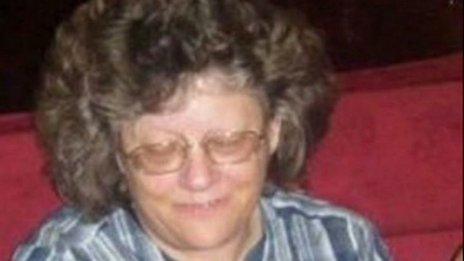Stephanie Bottrill suicide note blames government
- Published

Stephanie Bottrill lived alone in a three-bedroomed house
A woman who killed herself left a note blaming the government.
Stephanie Bottrill, 53, from Solihull in the West Midlands, died in the early hours of 4 May after being hit by a lorry on the M6 near her home.
Her family said she had been worried about how she would afford an extra £20 a week as a result of changes to her housing benefit.
Conservative MP for Meriden Caroline Spelman said there were discretionary payments available for special cases.
"I'm only so sorry that I didn't receive a request for help from Mrs Bottrill and, of course, I stand ready to help her family," said Mrs Spelman, in whose Meriden constituency Mrs Bottrill lived.
"There is discretion in these cases and what people need to do is ask for that help."
An inquest is due to open at Birmingham Coroner's Court on Tuesday.
Mrs Bottrill's son Steven said: "It feels like a dream... they've put all this pressure on her and I've lost my mum now."
A Solihull Metropolitan Borough Council spokesman said they did not know if Mrs Bottrill had applied for discretionary payments.
The council said Mrs Bottrill had two successful bids for properties and as far as the authority was aware, she was going to move into one of those.
'Got to stop'
Government changes mean families deemed to have more living space than they need are seeing their housing benefits reduced, something opponents have described as a "bedroom tax".
The government rejects this term, pointing out it is not a tax at all and should not be described as such.
Mrs Bottrill lived in a three-bedroom house on her own.
In her letter, she told her son not to blame himself for her death but said she "can't cope" anymore.
"It's my life, the only people to blame are the government," she wrote.
Mr Bottrill said his mother was already struggling for money for food and clothes.
"They told her they would be taxing her for the two empty rooms," he said.
"She knew she would have to move out eventually, but I think it was how it just came totally just straight away."
He said he wanted the government to rethink its policy.

Steven Bottrill said losing his mother "felt like a dream"
"It might look like a good idea on paper but the way it's affecting people... I've lost my mum now and eventually it's going to be someone else so it's got to stop," he said.
"It's definitely down to them putting this law in because she would have still been here."
David Jamieson, leader of the Labour group on Solihull Council, said he was "horrified" when Mrs Bottrill's family told him what had happened.
He said: "It does not seem a lot of money if you have got a lot of money, but it's a lot if you have got very little, and £20 a week has clearly pushed her over the edge to the point she felt she had no other option but to take her own life."
The council had offered Mrs Bottrill another property to live in about six miles away and she was considering whether to move there at the time of her death.
But she feared she would be cut-off from her neighbours and family, her son said.
"The problem is for Solihull Council housing is that there aren't the houses available," he said.
"There just aren't enough becoming vacant."
'Trying to bring fairness'
A spokesman for the Department of Work and Pensions said it was not appropriate to comment on individual cases.
"The changes to housing benefit are trying to bring fairness to the system," he said.
"There are currently two million people on the housing waiting list."
Mrs Spelman said in her Meriden constituency some 16,000 people were on the waiting list for social housing, but said "nobody is being forced out".
She added the government had made £150m available to councils to provide discretionary payments to protect the most vulnerable.
Samaritans told BBC News "although a catalyst may appear to be obvious, suicide is seldom the result of a single factor or event and is likely to have several interrelated causes".
- Published2 April 2013
- Published30 July 2013
- Published27 March 2013